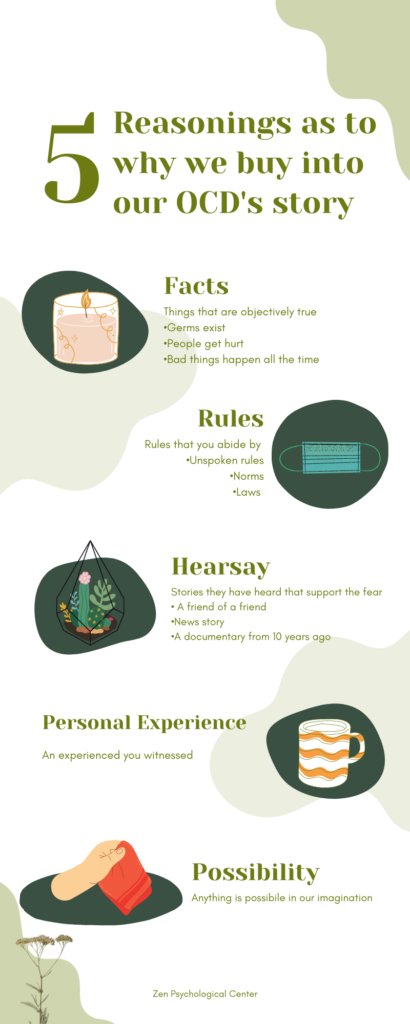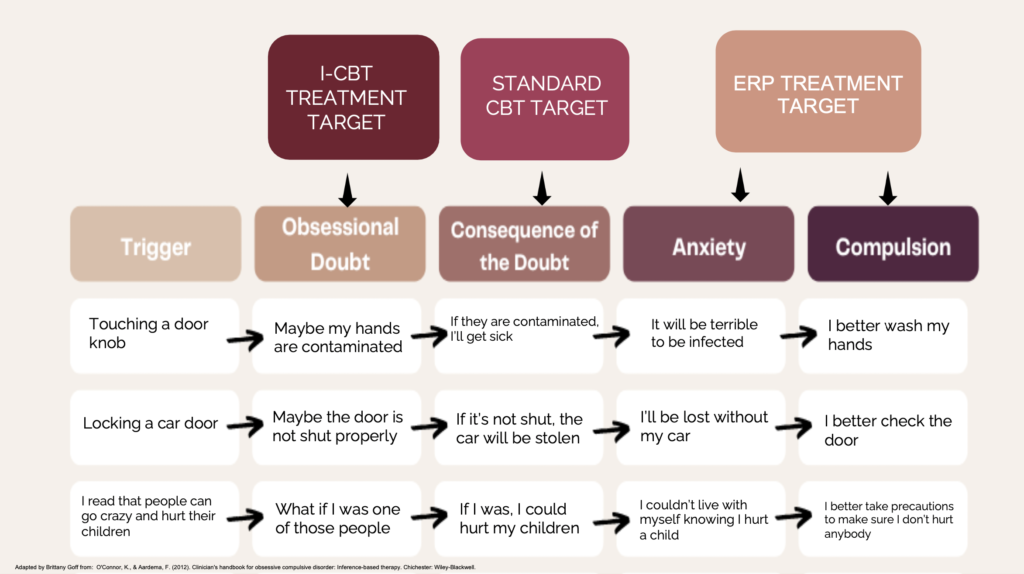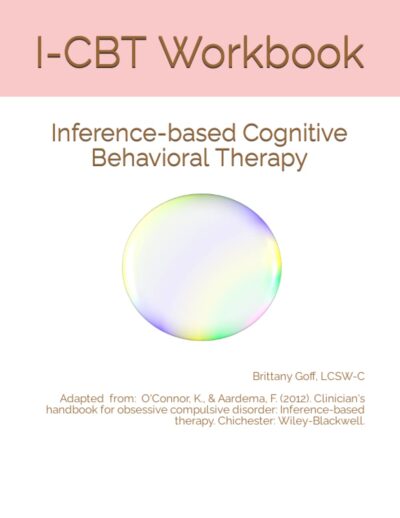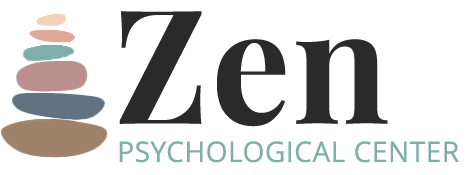Inference-based Cognitive Behavioral Therapy
What Is Inference-Based Cognitive Behavioral Therapy (I-CBT)?
According to Inference-based Cognitive Behavioral Therapy ( I-CBT ), your OCD isn’t random—it follows a unique, personal narrative built from facts you know to be true, your life experiences, cultural influences, learned rules, different stories you’ve heard, and your ability to abstractly envision the possibility. OCD takes these logical thought patterns, twisting them into vivid, catastrophic “what if” stories that feel urgent and believable. In response, you engage in compulsions to prevent these imagined disasters from coming into fruition. If you don’t, OCD convinces you that you’re a bad person or responsible for something terrible happening.
Traditional OCD treatments focus on resisting compulsions, but Inference-based Cognitive Behavioral Therapy ( I-CBT ) takes a different approach—it targets the source of the obsession itself.
How Does I-CBT Work?
Unlike traditional Exposure and Response Prevention (ERP), which aims to reduce anxiety by purposely provoking anxiety, I-CBT focuses on the cognitive process behind OCD rather than the behavioral response. This means:
-We treat OCD where it starts—at the obsession, not the compulsion
– No need to provoke anxiety on purpose—relief happens naturally by restructuring how you view your thoughts
– You learn to recognize OCD’s false narratives and stop engaging with them before they take hold
– You drop the obsession entirely, making compulsions unnecessary
Once you understand how your OCD narrative is constructed, you stop believing in it—allowing you to move on without exposure exercises or prolonged distress.

.

What is the Vulnerable Self Theme?
The Vulnerable Self Theme/ Feared Self (VST/FS), is a concept from Inferenced-based Cognitive Behavioral Therapy (I-CBT). According to I-CBT, you have an underlying theme throughout all of your different themes of OCD. All of your obsessions and compulsive behaviors revolve around doing everything to avoid becoming this feared version of yourself. You can have more than one Vulnerable Self Theme. Once you gain this insight into your own VST’s/FS’s, you can identify which particular OCD doubts you are more susceptible to, leading to disengaging in the obsession.
Many sufferers of OCD have the fear of being negligent or careless. This will drive you to obsess on areas requiring concentration and attention. Below are some examples:
- “What if I hit a pedestrian?”
- “What if my stove is left on?”
- “What if I don’t wash my hands correctly and get other people sick?”
- “What if I don’t cook this thoroughly and people get sick?”
Behaviors seen with this VST/FS:
- Excessively checking various items.
- Ruminating about not doing enough for your children.
- Mentally replaying memories of turning off appliances.
Being Somebody that Could Harm
A common Vulnerable Self Theme is the fear of being somebody who will cause harm. Common obsessive doubts include:
- “What if I act on a sudden urge to hit a pedestrian?”
- “What if I snap and kill someone?”
- “What if I harm myself without wanting to?”
This can present in three ways: accidental or intentional harm to self, others by you, or others by external factors.
Losing Control
Many sufferers of OCD have the fear of losing control. This will drive you to avoid situations where losing control has severe consequences such as:
- Driving
- Quiet public places; ex: church, movie theater, library, etc.
- Handling or being near anything fragile
Prone Illness
Another Vulnerable Self Theme is being somebody that is prone to illnesses and/or diseases. This will drive you to avoid being exposed to any type of illness, and/or obsess about having a specific illness. Below are some examples:
- Questioning if you have an undiagnosed health or mental health condition
- Cancer, HIV, schizophrenia, autism
- Washing hands in ritualized ways
- Avoiding touching public objects
- Researching illnesses excessively
- Checking body for signs of an illness
- Urgently visiting doctors or the ER only for staff to not find anything wrong.
Embarrassment
Is there any chance you excessively fear being embarrassed? This will drive you to obsess on situations where you might make a public mistake. Below are some examples:
- Rehearsing what to say in conversations to prevent saying the wrong thing
- Excessively checking for mistakes on texts, emails, documents, etc.
- Ruminating on embarrassing memories
Negative Agenda
You might have a fear of secretly having a negative agenda. You may wonder if you have some evil unconscious side of you that could come out at any time? Some examples are:
- Relationship OCD: “What if I don’t really love my partner?”
- Harm OCD: “What if I secretly want to harm someone?”
Fear of Being Inevitably Doomed
You may obsess about being prone to something awful happening to you such as:
- Natural disasters
- Tornados, earth quakes, tsunamis, hurricanes, quick sand, volcanos
- Accidents/human disasters
- Car accidents, plane accidents, terrorist attacks
- Diseases or Illnesses
- Cancer, HIV
- Personal Harm
- Kidnappings, break ins, assaults
Having an Unending Feeling
The feeling of anxiety is uncomfortable, but do you ever fear that the feeling of anxiety will last forever? Do you fear not being able to handle the feeling? This VST/FS manifests commonly with:
- Meta OCD (“What if these thoughts last forever?”)
- Sensiomotor OCD (“What if I never stop noticing my breathing?”)
Your Content Goes Here
.
Why Choose I-CBT for OCD?
🔹 A cognitive, rather than behavioral, approach to OCD
🔹 No exposures to anxiety-inducing situations
🔹 Effective for all subtypes of OCD
🔹 Empowering, non-harmful, and neurodivergent-friendly
.
.
📚 Learn More: Check out our resources for expert insights and support.
Did you know...
We have an I-CBT Workbook!


